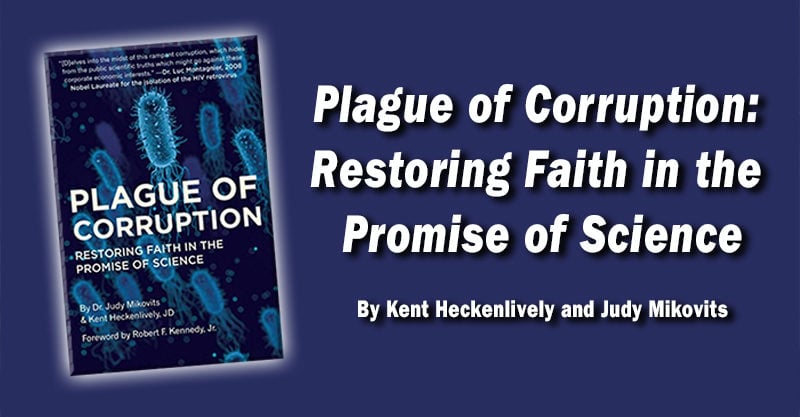May 19, 2020
PLAGUE OF CORRUPTION – Two Critical Questions
By Kent Heckenlively, JDWhile PLAGUE OF CORRUPTION covers a lot of territory in detailing what can go wrong when conflicts of interest are allowed to guide scientific investigation, I see two main, critical questions that I believe we answered within the pages of our book.
Questions:
Is Dr. Judy Mikovits an honest researcher? On Friday, November 18, 2011, police raided the home of Dr. Mikovits in Southern California and took her to jail. No arrest warrant has ever beenproduced. She was held without bail until Tuesday, November 22, 2011. She was later forced to go to Reno, Nevada, where a mug shot was taken, and published by Jon Cohen in the journal Science.
No charges have ever been filed against Dr. Mikovits and no trial has ever been held. Despite this fact, all federal grants were taken away from Dr. Mikovits, depriving her of the ability to do research at any academic institution.
Dr. Mikovits has spent more than half a million dollars in legal fees trying to get her case heard inside an actual courtroom but has been blocked by government authorities. From 2015 to 2018, her case was held under seal by the Attorney General of Nevada, and only released when she was essentially bankrupt.
Dr. Mikovits has met voluntarily on several occasions with the FBI, urging them to investigate her charges of corruption, and has given them hard drive copies of all materials. They have not pursued these claims, essentially saying in one of the interviews, “The bad guys need to steal a lot more money from the federal government before we’ll get interested.”
Is there a danger in mixing animal and human tissue in labs and using those products as medical therapies? One need look no further than the publications of top scientists regarding xenotransplantation (the transferring of the biological tissue of one species into another) to realize this is being done in both vaccine development and the branch of medicines in which they are classified, known as “biologics.”
This is what researchers from Harvard University told the World Health Organization in 2012:
Xenotransplantation is any procedure that involves the transplantation, implantation, or infusion into a human recipient of live cells, tissues, organs from an animal source. This definition may include human bodily fluids, cells, tissues, or organs that have had ex vivo [outside the body] contact with live non-human cells, tissues, fluids, or organs . . . As with any form of transplantation, xenotransplantation carries the potential risk for transmission of both known and unknown zoonotic infectious agents of animal origin into human recipients and into the wider human population.[i]Biologics including vaccines use animal tissue mixed with human tissue which is then injected or ingested into human beings. That’s not an opinion. It’s a statement of scientific fact. I challenge anybody to find fault with that assertion. We know that the human genome is composed of about 7-8% silenced viruses and we can assume that animals must be roughly similar.
When animal and human tissue are mixed in a lab, the immune systems of these organisms are not functioning because these tissues are outside the body. It’s a recipe for viral expression. In trying to quiet the activity of one dangerous virus, the scientists are inadvertently opening up the entire asylum of viruses of both animals and humans, allowing these viruses to run rampant and promiscuously recombine to create new monsters to devastate our world.
Who knows? If we aren’t careful, one of these newly created pathogens might escape and cause a worldwide pandemic, shutting down the global economy. Could that happen? Am I being too alarmist? I know, it sounds like science fiction, right? How could a virus ever shut down the world economy?
[i] Jay A. Fishman, Linda Scobie, Yashuiro Takeuchi, “Xenotransplantation-Associated Infectious Risk: A WHO Consultation,” Transplantation, Vol. 19; 72-81 (2012); doi:10.1111/j.1399-3089.2012.00693.x..

No comments:
Post a Comment